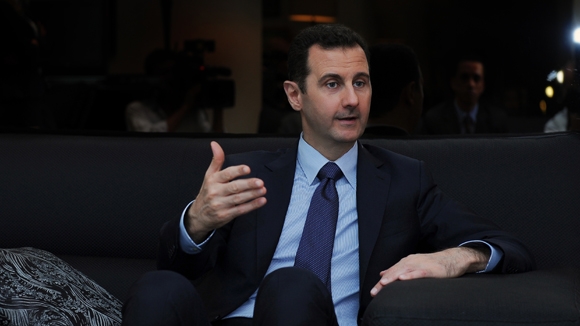Here is an illuminating snapshot of co-operation between Syria and Russia over propaganda, aiming at an English-speaking audience.
On Monday morning, we woke to President Assad’s lengthy interview with the Russian newspaper Izvestia. I initially took a sound-bite from AFP and looked at the English translation as presented by Syrian State news agency SANA.
Something did not ring true in SANA, notably Assad’s supposed emphasis on “Takfiris” [Muslim heretics] attacking Damascus — that word has been a go-to label in Syrian and Iranian propaganda for the insurgency. So, wanting to have an accurate sense of the full discussion, I asked EA’s Joanna Paraszczuk to translate the Izvestia account.
That was at 0545 GMT. Fifteen minutes later, Paraszczuk’s first entry was posted in a special feature. She completed the translation at 0815 GMT.
See also Syria Feature: English Translation Of President Assad’s Interview With Izvestia
The article has been one of the most-viewed on EA’s website, a testimony to its importance as perceived by readers.
But that is only the start of this story.
At 1415 GMT, we noticed that The Interpreter, an English-language website covering news from Russia, was tweeting about another translation.
Syria President Bashar al Assad speaks to Russia's "Izvestia" http://t.co/4Netc464Q7
— The Interpreter (@Interpreter_Mag) August 26, 2013
And The New York Times was also passing on the news:
English version interview with Syrian president, Bashar al-Assad, in Russia's Izvestia newspaper. http://t.co/9zvdGAnkag
— New York Times World (@nytimesworld) August 26, 2013
So had EA missed something? Or had a distorted account of Assad’s interview now in circulation?
We immediately found the red-flag word “Takfiris” throughout the text.
So we checked further. The translation on Izvestia was curious.The Russian paper does not have an English-language site — it had chosen to make an exceptional case and put an English text on its Russian site.
So was Izvestia posting an accurate translation of its interview?
No — and here’s the propaganda twist.
Izvestia’s translation — published at 1040 GMT — is a word-for-word duplicate of the distorted version posted by Syria’s SANA hours earlier.
The lesson? When I asked Joanna Paraszczuk to translate the interview, I also wondered how he was going to get his message across to the English-speaking world.
Publication on SANA’s English site is one way, obviously, but SANA carries the label of “Syrian regime outlet”.
So here was a second stage: publish the article on Izvestia and look for international media to take it from there.
Which, in at least two cases, is exactly what has happened.

